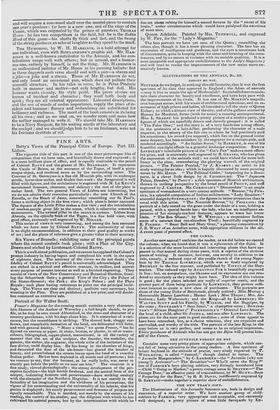Portrait of Sir Walter Scott; Fraser's Magazine for the ensuing
month contains a very character- istic likeness of the Author of Waverley ; a full-length sketch, in pro- file, as he may be seen round Abbotsford, in the dress and character of a country gentleman, with his dogs about him. It is somewhat of a cari- cature, but the resemblance is striking. The shrewd look, shaggy eye- brows, and remarkable formation of the head, are delineated with force, and with general fidelity. "Nasty a time," we quote Fraser, "has he figured on canvass or paper, in stone, bronze, or plaster, in oil or water- colours, lithographed, copper-plated, mezzotinted, in all the variety of manner that the art of the sculptor, the founder, the modeller, the painter, the etcher, the engraver, the whole tribe of the imitators of the face divine, could display him. He has hung in the chamber of kings, and decorated the door of the ale-house—has graced the boudoir of beauty, and perambulated the streets borne upon the head of a swarthy Italian pedlar. He has been depicted in all moods and all postures ; but we venture to say, that the baronet, as he really looks, was never so exactly put before the public as we now see him." The cranium is a fine study, viewed phrenologically : the strong development of the per- ceptive faculties—the high double forehead, and the conical form of the occiput, indicating firmness and perseverance—have striking analogy with the character of the Northern Magician. It is not merely in the fecundity of his imagination and the vividness of his perceptions, the vigour of his understanding and the universality of his talents, that his genius is displayed ; his steady perseverance and firmness of purpose are equally remarkable. This is testified, not merely by the extent of his reading, the variety of his studies, and the diligence with which he has cultivated his natural powers, but by the determination with which he has set about raising for himself a second fortune by the" sweat of his brain," under circumstances which would have paralysed the exertions of most men.


























 Previous page
Previous page